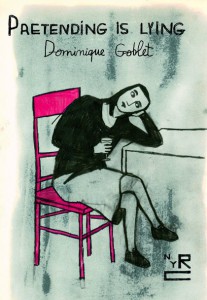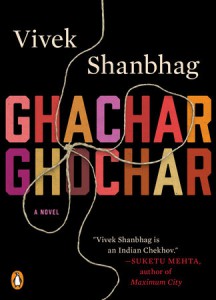
Pretending is Lying by Dominique Goblet, tr. Sophie Yanow, New York Review Books
Review: Sam Carter, Assistant Managing Editor
Dominique Goblet’s Pretending is Lying, translated by fellow cartoonist Sophie Yanow in collaboration with the author, immediately recalls the best work of those figures like Alison Bechdel, Adrian Tomine, and Chris Ware, who have done so much to insist on both the relevance and elegance of the graphic narrative form in the Anglophone world. Fortunately, New York Review Books is dedicated to showcasing the many voices contributing to an ongoing, worldwide comic conversation, and its latest contribution is this Belgian memoir. Originally titled Faire semblant c’est mentir, it centers on the experiences of Dominique—a fictionalized version of the author herself—as she navigates fraught relationships with her parents, including with her looming lush of a father. Also sketched out is a romantic relationship where Dominique attempts to grapple with that most fundamental question of heartbreak: why did he leave me?
A certified electrician and plumber, Goblet clearly understands a thing or two about the necessary connections running through structures to make them work, and her illustrations carry this skill into Pretending is Lying, her first work to appear in English. Image and text perform an intricate choreography, reveling in an aesthetic that frequently slips between the easily imitated and the utterly remarkable. If the easy analogy for reading comics is the process of examining a series of film stills—and even if we might be tempted to label parts of the construction of this work cinematic—I would instead suggest that Goblet offers something that more closely resembles a well curated series of photographs, each of which could easily stand on its own, given each frame’s clarity of vision and attention to detail.
In illustrations that move from Rothko-like explorations of pure color to nuanced collections of penmanship that gradually reveal a series of ethereal forms, the melancholia that we often find in other works emerges here as well—maybe there’s something about the form that lends itself well to expressions of such emotions in its ability to match words with alternatively visceral and measured strokes. The muted color palette of Pretending is Lying is also remarkably expressive.
A particularly poignant issue that the translation of such comics brings into view in an era of nearly ubiquitous print technologies is the singular effect of reading another person’s handwriting. Goblet exploits to full effect the wide range of emotions that handwriting might convey, with scrawling script that reaches across frames to signal sadness, despair, and failed attempts to understand. As the title page informs us, the English lettering was done by Goblet herself, thereby adding a new element to the circuit of communication that runs through author, translator, and the production of the finished translation. Quoting the text would therefore be reductive at best and at worst a disservice—just as it would be to choose just one image from this powerful book to reproduce here.

Ghachar Ghochar by Vivek Shanbag, tr. by Srinath Perur, Penguin Random House
Review: Saba Ahmed, Social Media Manager, UK
“All happy families are alike,” writes Tolstoy, but “each unhappy family is unhappy in its own way.” Vivek Shanbhag’s Ghachar Ghochar is a story which complicates these words. Told from the perspective of a thoughtful but passive young man, it pieces together the portrait of a middle-class family in Bangalore, South India, whose fortunes change overnight following the success of a new business venture: bulk-buying spices from Kerala and packaging and distributing these across the city.
Here are finely observed moments of happiness suffused with tenderness, humor, and wit—communal cups of tea brewed using carefully regulated kerosene from a gas cylinder; the instant of sheer relief when a discrepancy in Appa’s accounts is resolved; a frenzied shopping spree to furnish a new home. The family coalesces into a single unit as they contend with the trials and tribulations of daily life, “walking like a single body across the tightrope of our circumstances,” uncannily like the colony of ants, which proves to be a constant source of anxiety to Amma.
Once they move into the expansive space of their new house, the configuration of domestic relationships rearranges. The narrator’s sister, Malati, unable to sustain a happy marriage with her husband, moves back to the family home—her private thoughts a mystery to the others. The narrator, on the other hand, stage-manages his day-to-day routine, spending most of it looking at sepia-tinged photographs of the historic city in the elegant Coffee House, and napping on his office sofa where he is nominally appointed Director of Sona Masala by his entrepreneurial uncle, Chikkappa.
Ghachar Ghochar is not the first English translation of a Kannada novel, but it is curiously engaged with the very function of language. Shanbhag writes from a multilingual inheritance, translating and living between Konkani, Kannada, and English. Srinath Perur’s translation reads fluidly, modulating between idiomatic expressions and tidy epigrammatic structures which collapse on further examination, inviting multivalent re-readings.
In one of the most striking passages in the novel, the narrator tries to describe the intensity of his wedding night:
“Perhaps it is this instant that forms the basis of traditional marriage—a complete stranger is suddenly mine. And then, I am hers, too; I must offer her my all … Language communicates in terms of what is already known; it chokes up when asked to deal with the entirely unprecedented.”
A few nights later, language becomes a shared joke between the two lovers when the narrator fumbles clumsily with the drawstring of Anita’s underskirt. It has become all ghachar ghochar, a nonsense phrase—the voiced plosive ‘gh’, the sibiliant ‘ch’, repeated for sonic unity—indicating a knot that can’t be undone. But the phrase becomes equally prone to misunderstandings when used in the wrong context, shifting meanings and relationships.
Strangeness, surrender, dependence, compassion, love, entitlement, frustration; these are the various feelings aroused by the relationships in Shanbhag’s novel. In the closing pages, we see the family sitting together over tea and rusks, recalling old nicknames for each other, easing the knots that have tightened over the years. It is a bittersweet nostalgia. “What can I say,” the narrator notes wryly, “it is one of the strengths of families to pretend that they desire what is unavoidable”. In this masterful and economically spare novel, these words certainly offer a compelling counterpart to Tolstoy’s.

Mirror, Shoulder, Signal by Dorthe Nors, tr. Misha Hoekstra, Pushkin Press
Review: Thea Hawlin, Social Media Manager
I am currently learning to drive. The initiated will know my terror, the nervous brakes, realizing that your hands steer a giant piece of metal that can, at any given moment, turn against you and stall. Sonja, the protagonist of Dorthe Nors’s Mirror, Shoulder, Signal—her latest book to be translated into English—is also learning to drive. Over forty and alone in Copenhagen, the same anxieties plague her. It seems no matter what your age, the trial of learning to change gears is universal.
As the first Danish writer to place a story in The New Yorker, Nors has already garnered critical attention; reading her latest work, it’s easy to see why. With a female narrator over forty, she brings a voice to the table that’s rarely heard with such veracity. The best translations hardly feel like translations at all, but rather books that have found a new skin. Misha Hoekstra’s translation of Nors is one such; it feels effortless.
Despite the initial strength of Sonja’s voice, inaction plagues this novel. At one point Sonja looks out and craves motion: ‘I need some catastrophe’—it’s easy to agree. Sonja works as a translator, ensuring crime novels filled with disturbing scenes of blood and abuse reach new audiences. Her own life remains the perfect opposite to the world she translates.
As she learns to drive, Sonja learns about herself. The parallels of driving and walking center around re-learning how to encounter and interact with the world. From her origins in rural Denmark to the buzz of the capital, Sonja reflects on the changing landscapes of her inner and outer life. Place is of utmost importance to Nors, ‘how earth can make you feel’, but more precisely the concept of place: the places we carry with us and the places we leave behind. ‘The place you come from is a place you can never return to. It no longer exists,’ Sonja says to herself, ‘and you yourself have become a stranger’. Aware of her changeability, she comes to terms with the fact that leaving her hometown of Balling has impacted her. ‘Not much Jutland left in you,’ an observer says at the start, and she takes this lack to heart. The landscape of her childhood alters, ‘farms swallowing each other’, just like the cityscape: ‘apartment blocks are sprouting up like Lego bricks’. She comes to realize ‘how far you can move without getting anywhere’.
The dilemma of contact, the lack of it, and the tremors of loneliness that can exist even in daily activities is an ongoing theme. ‘It’s wonderful being delved into’, one character notes wistfully. Sonja is lonely. Even her older sister Kate, a woman who seems to have it all, who has ‘never colored outside the lines’, finds the search for happiness just as intangible. The distance, both physical and emotional, between the sisters intertwines with Sonja’s quest to drive. Driving establishes itself as a means of control, a form of security whereby Sonja can harness her transforming world.
Yet amid the severity of self-discovery, there are also moments of enlightened comedy. A masseuse who tenderly holds the ‘back of the heart’ in one moment, in the next proclaims Sonja a ‘tight arse’ in all senses of the phrase. Stress and the knots of Sonja’s ageing body are omnipresent: ‘her shoulder is not a shoulder it’s a feeling’. Sonja’s body betrays her, her defective arched feet ‘don’t want to grab the earth,’ her face becomes ‘a sieve that would let water trickle right out’. Most debilitating of all she suffers from otolithic Positional Vertigo, a condition that continually disables her at the most inconvenient times.
Bodies pervade the tale almost as rigorously as the landscape. Through driving Sonja must anticipate ‘the patterns her body must make in order to drive’. Like the land she adapts, her body morphs with the strain of change and the continual growth the world demands. This movement holds convincingly for language too. Whether in the casual racism of a driving instructor, swear words, or the discourse Sonja uses to define herself, the power of designation rings true: it’s ‘hard to find words to fit the people you love’ for a reason.
Although Nors’s prose is evocative, the book is filled with questions that nag for answers. ‘Tales without a climax don’t have any appeal’ for one character, and it’s easy to side with this view. Sonja spends a lot of time contemplating: at one point she lies on her bed wishing to be ‘not so much in the middle of her life as with a view of it’. The entire book is one long process of awakening, in which Sonja moves the opposite way, from passive observer of her own life, to a final resolve for action. Driving is the start of this transformation, a manifestation of Sonja’s wish for the mobility to decide the direction of her life, but changing gears—as any driver will know—is not always an easy ride.
*****
Read More Reviews:

